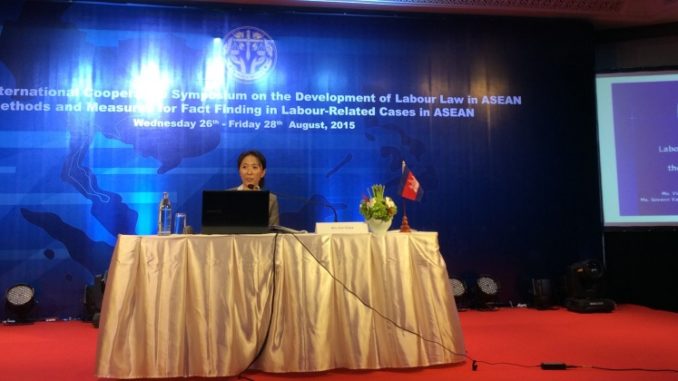
The symposium focused on “Methods and Measures for Fact Finding in Labour-Related Cases in ASEAN”. On behalf of the AC, Arbitrator Ann Vireak presented to symposium attendees an overview of the Cambodian labour dispute resolution procedure, particularly the AC process and how the AC collects facts and evidence to support its decisions.
The presentation discussed AC jurisdiction and power granted under the Prakas #099 issued by the Ministry of Labour and Vocational Training. Under the Prakas, the AC has been given a broad power to conduct any investigation, including requiring parties to present any documents or information that would be useful to accomplish its mission. Discussion also covered the parties right to examine evidence presented to the AC. The presentation drew attendees attention to the relationship between the AC and courts, in which the final arbitral award should be enforced by the court unless the following objections are raised: (1) parties were not properly involved in the selection of the Arbitrators or were not given proper notice of the arbitral proceeding or were unfairly prevented from making a full presentation of their case; (2) non-compliance with procedures set out in the Law; or in situations where (3) the AC render an award which goes beyond the power given to the AC by the Labour Law and Prakas.
The symposium was an excellent opportunity for ASEAN countries to share experiences and learn from each other on best practice labour dispute resolution. It is noted, for example, that Thailand and Philippines have specialized labour court systems (including alternative dispute resolution (ADR)) while other countries have utilised ADR as the primary process for labour dispute resolution. Myanmar has a very similar tripartite arbitration system to the Cambodian Arbitration Council; where 3 members hear any labour dispute but Myanmar arbitration system also has an appellate jurisdiction – similar to levels within a court. A representative from the Industrial Court of Malaysia urged ASEAN countries to reference and consider each other’s decisions on labour disputes when hearing disputes, as workers frequently cross borders to work in the region and it is important that the strict formal elements of individual national court rules and procedure are avoided where possible in the industrial sphere. Labour disputes are by nature different from other disputes as disputing parties have to continue working with each other and therefore the need to resolve matters quickly, and in the most legal yet practical way, is critically important.
